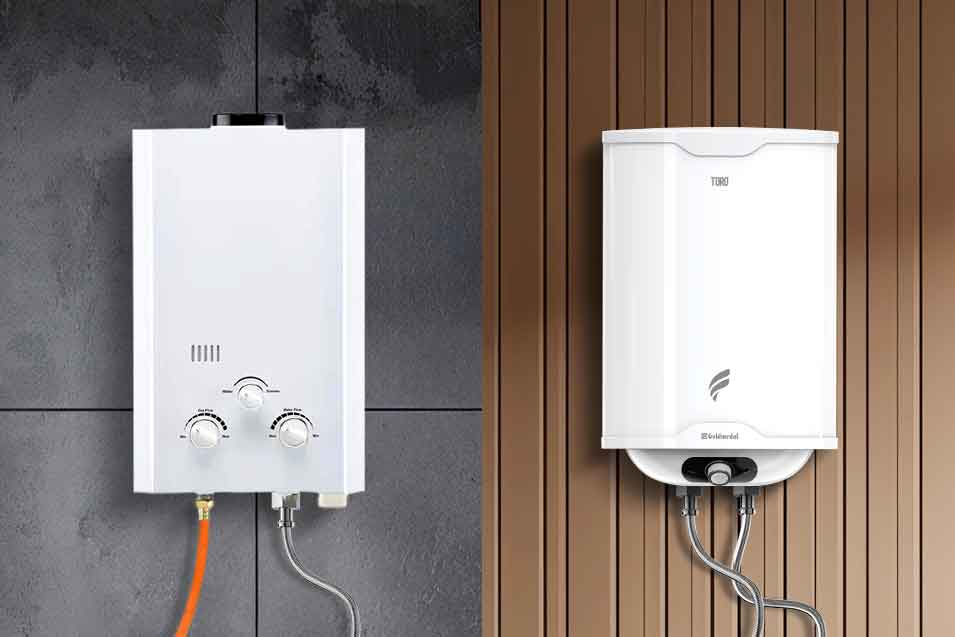
Gas Geyser vs Electric Geyser – What’s the Difference?
01st August 2025 | Written By: Utsavi Tank | Read Time: 3min | Last Updated: 07th October 2025
Introduction
After a long day at work, going home to a relaxing shower is something to look forward to. In such a case, you need a geyser that is tailored to your lifestyle. When it comes to heating water the two most popular choices are gas geysers and electric geysers. While both appliances heat water, their heating mechanisms, safety features, and overall features can significantly impact your daily routine. Let us explore the key differences between gas geysers and electric geysers to help you choose the right one.
Gas Geyser vs Electric geyser
| Feature | Electric Geyser | Gas Geyser |
|---|---|---|
| Cost of product | Instant electric geyser: ₹6,000 – ₹8,000 | Instant gas geyser: ₹4,000 – ₹5,000 |
| Safety | Extremely safe | Not very safe; risk of gas leakage |
| Time Consumption | Takes slightly longer | 3 times faster than electric geyser |
| Space Consumption | Needs only wall-mounting space | Requires extra space for LPG cylinder + ventilation |
| Life Span | 7–10 years | Burners may get damaged frequently |
| Installation | Easy and straightforward | More complicated (gas connection & ventilation) |
| Fuel for Energy | Electricity | LPG/PNG gas |
| Environmental Impact | No direct pollution | May release toxic carbon monoxide |
| Warranty | At least 2 years | 1–2 years |
What is a Gas Geyser?
The primary difference between a gas geyser and an electric geyser lies in their energy sources. As the name suggests, a gas geyser uses LPG (Liquified Petroleum Gas) to heat water in your bathroom. When the tap is turned on, the water flows through the pipeline and gets heated by the gas burner in the geyser. Gas geysers do not depend on electricity which makes them a good choice in areas with frequent power cuts.
Types of Gas Geysers:
- Instant Gas Geysers – heats water instantly as it flows through the geyser. It is ideal in small families or kitchen usage.
- Storage Gas Geysers – stores certain amount of water in the tank before heating. Suitable for larger households and multi-point needs.
-
Advantages of Gas Geyser
- Complete control of the level and rate of heating
- They can run on both, pipeline and gas cylinders
- Ideal for large families
- Easy to repair and maintain
- Doesn’t require electricity
-
Disadvantages of Gas Geyser
- Shorter durability
- High risk of gas leak
- Not environment friendly
What is an Electric Geyser?
As the name suggests, electric geysers run on electricity. They are widely used in urban households, due to their convenience, stable electric supply, and ease of installation. An electric geyser uses a copper coil that heats the water flowing through it.
-
Advantages of Electric Geyser
The main advantage of an electric geyser is its convenience. It allows you to get hot water with just the flip of a switch. Other advantages include:
- They are easy to install and handle
- They heat water very quickly
- They tend to be safer as there is no direct fuel involved
- The energy source is relatively cheap
- They have a longer life span and are durable
-
Disadvantages of Electric Geyser
- Rely largely on a constant power source to function.
- Tend to be expensive to purchase, operate and maintain.
Conclusion
While both have their pros and cons, and the final choice largely depends on your specific household needs, energy availability, and safety preferences.
- A gas geyser is better in case you require reduced operational costs and an assured gas supply with proper ventilation.
- An electric geyser is an ideal low-maintenance, reliable option where electricity is available.
Whatever your choice, ensure proper installation by a certified technician and carry out routine maintenance to keep the system in an efficient and safe working condition.

Frequently Asked Questions (FAQs) :
- Q1. Are gas geysers safe for indoor use in apartments? Gas geysers are generally not safe for indoor use without proper ventilation, as they emit carbon monoxide. Use electric instant geysers instead.
- Q2. Can a solar water heater replace gas or electric geysers? Yes, a solar water heater can replace gas or electric geysers for most of the year. Get a backup electric or gas unit for cloudy or rainy days.
- Q3. What is the average lifespan of gas vs electric geysers? Gas geysers can function for at least 6–8 years while electric geysers on the other hand typically last for 8–12 years.




